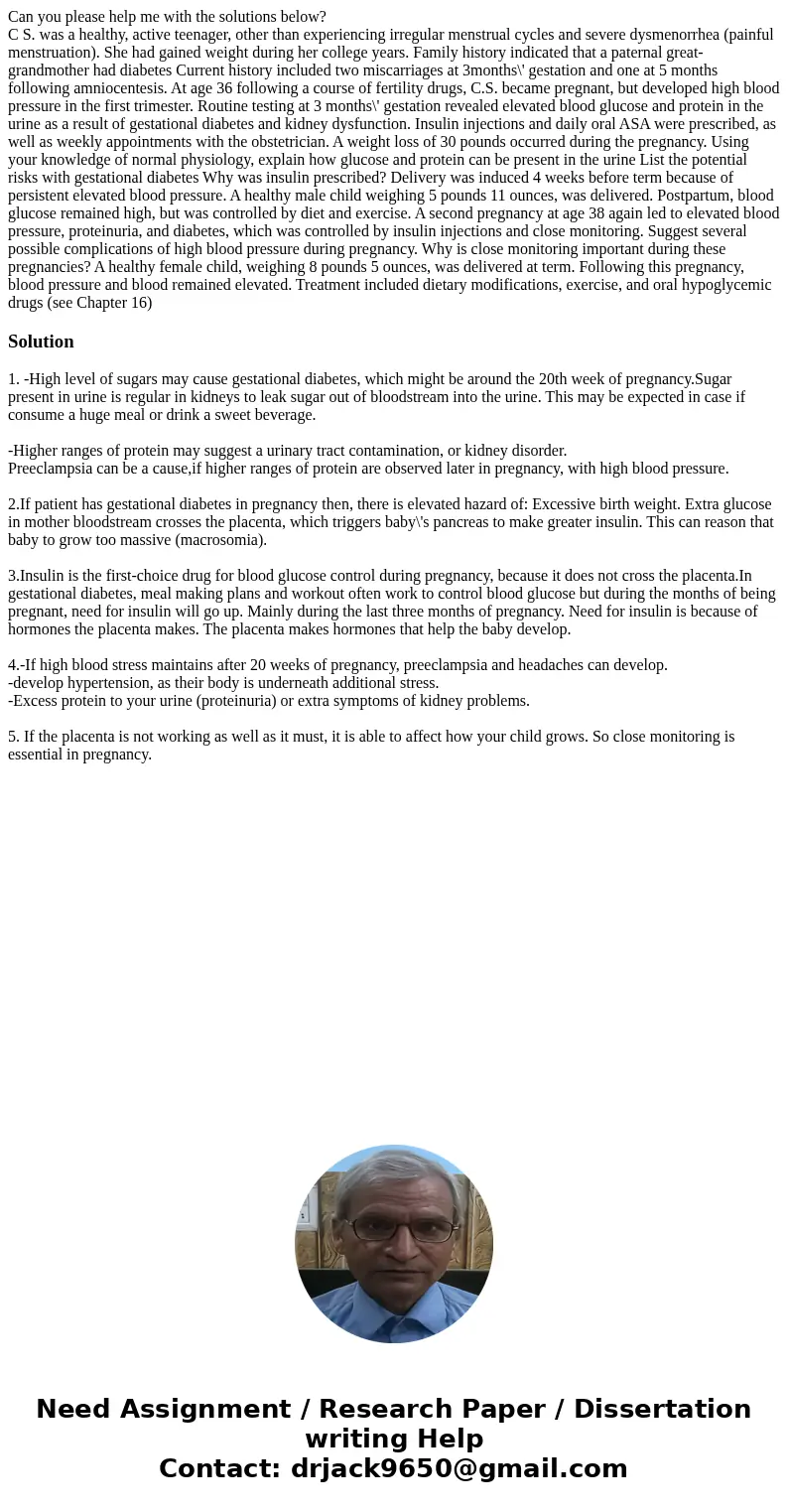Can you please help me with the solutions below?
C S. was a healthy, active teenager, other than experiencing irregular menstrual cycles and severe dysmenorrhea (painful menstruation). She had gained weight during her college years. Family history indicated that a paternal great-grandmother had diabetes Current history included two miscarriages at 3months\' gestation and one at 5 months following amniocentesis. At age 36 following a course of fertility drugs, C.S. became pregnant, but developed high blood pressure in the first trimester. Routine testing at 3 months\' gestation revealed elevated blood glucose and protein in the urine as a result of gestational diabetes and kidney dysfunction. Insulin injections and daily oral ASA were prescribed, as well as weekly appointments with the obstetrician. A weight loss of 30 pounds occurred during the pregnancy. Using your knowledge of normal physiology, explain how glucose and protein can be present in the urine List the potential risks with gestational diabetes Why was insulin prescribed? Delivery was induced 4 weeks before term because of persistent elevated blood pressure. A healthy male child weighing 5 pounds 11 ounces, was delivered. Postpartum, blood glucose remained high, but was controlled by diet and exercise. A second pregnancy at age 38 again led to elevated blood pressure, proteinuria, and diabetes, which was controlled by insulin injections and close monitoring. Suggest several possible complications of high blood pressure during pregnancy. Why is close monitoring important during these pregnancies? A healthy female child, weighing 8 pounds 5 ounces, was delivered at term. Following this pregnancy, blood pressure and blood remained elevated. Treatment included dietary modifications, exercise, and oral hypoglycemic drugs (see Chapter 16)
1. -High level of sugars may cause gestational diabetes, which might be around the 20th week of pregnancy.Sugar present in urine is regular in kidneys to leak sugar out of bloodstream into the urine. This may be expected in case if consume a huge meal or drink a sweet beverage.
-Higher ranges of protein may suggest a urinary tract contamination, or kidney disorder.
Preeclampsia can be a cause,if higher ranges of protein are observed later in pregnancy, with high blood pressure.
2.If patient has gestational diabetes in pregnancy then, there is elevated hazard of: Excessive birth weight. Extra glucose in mother bloodstream crosses the placenta, which triggers baby\'s pancreas to make greater insulin. This can reason that baby to grow too massive (macrosomia).
3.Insulin is the first-choice drug for blood glucose control during pregnancy, because it does not cross the placenta.In gestational diabetes, meal making plans and workout often work to control blood glucose but during the months of being pregnant, need for insulin will go up. Mainly during the last three months of pregnancy. Need for insulin is because of hormones the placenta makes. The placenta makes hormones that help the baby develop.
4.-If high blood stress maintains after 20 weeks of pregnancy, preeclampsia and headaches can develop.
-develop hypertension, as their body is underneath additional stress.
-Excess protein to your urine (proteinuria) or extra symptoms of kidney problems.
5. If the placenta is not working as well as it must, it is able to affect how your child grows. So close monitoring is essential in pregnancy.

 Homework Sourse
Homework Sourse